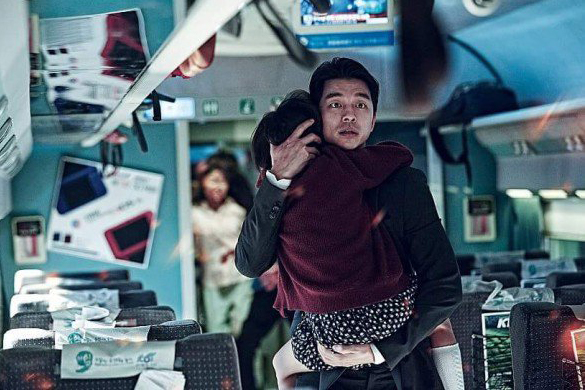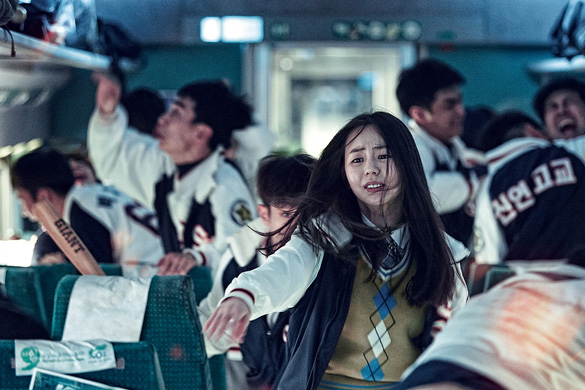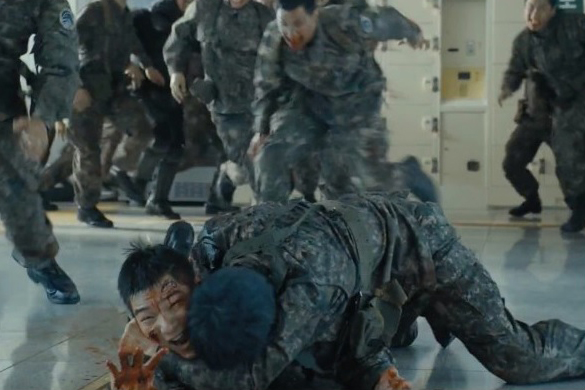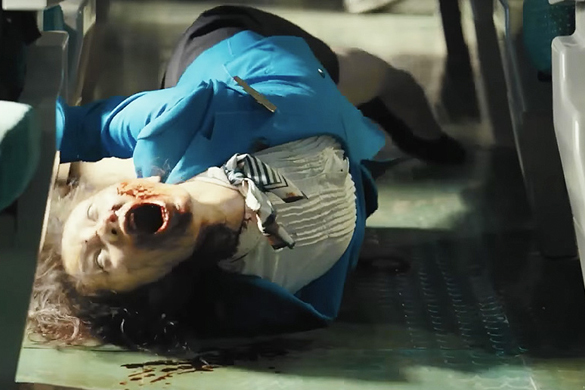"You’re trying to help people again! Why do you always do that? You should only look out for yourself!"
Synopsis:
Seok-woo (Gong Yoo) has been raising his young daughter, Su-an (Kim Su-an), since splitting from his wife. However, his job as a fund manager takes up the vast majority of his time and regularly causes him to miss pivotal events in his daughter’s life, the young girl often left in the care of Seok-woo’s aging mother.
As Su-an’s birthday approaches, she pleads with her dad to take her to Busan to visit her mum. Again citing work commitments, Seok-woo at first turns her down but when he messes up her birthday gift he finally acquiesces.
And so, the two board the train to Busan blissfully unaware that not only is a chemical leak causing the dead to be reanimated as flesh-craving zombies – feeding on others and turning them into the undead, too – but also that one of the infected has managed to board the train.
As the train rockets towards its destination and zombie numbers quickly rise, Seok-woo, Su-an and the other terrified passengers come to the shocking realisation that the train to Busan may well be the last journey they ever make...
Review:
‘Train to Busan’ begins with a small scene prior to the appearance of the film’s title in which a farmer goes through a checkpoint relating to a “small leak” nearby. On driving away, he scrabbles for his phone and while his eyes are off the road he hits and kills a deer. As the camera slowly pans back to the animal's carcass it twitches and in a fairly creepy and twisted fashion it raises itself back onto its feet, blood-soaked and complete with white, glazed zombie eyes.
As such, in just a couple of minutes, director Yeon Sang-ho perfectly circumvents the need for any early, clunky exposition to explain the leak and its terrible effect. Okay, so it wouldn’t be that much to explain anyway – zombie films do tend to have fairly simple stories – and the fate of the deer is blatantly obvious from the moment we see it dead on the road, but this decision nonetheless instantly raises ‘Train to Busan’ above a great deal of the past (sometimes painfully narrated) competition, at the same time as providing a near perfect enticement into the main post-title narrative.
Yeon Sang-ho spends a decent amount of time detailing the home life and relationship of Seok-woo and Su-an, underlining Seok-woo’s constant use of work commitments as an excuse for his less than exemplary parenting and Su-an’s vocal statements that she knows his promises are all lies, for example, in the process.
Even at this early stage, the appearance of gentle humour is noticeable (when Seok-woo buys Su-an a Wii for her birthday on opening the gift she says nothing, simply staring across the room at the Wii she already owns sitting on the table, etc) and this humour carries through to the introduction of the other main characters through interactions with Seok-woo and Su-an, especially in the case of Sang-hwa (Ma Dong-seok) – on finding out Seok-woo is a fund manager in the midst of the zombie outbreak, for example, he nonchalantly states that Seok-woo already feeds off people; and when Su-an is invited to touch his pregnant wife’s stomach, he proudly proclaims “I made that!” – ensuring smiles are never far from viewers’ faces, even as the zombie apocalypse gets underway.
 |
And speaking of the zombie apocalypse:
Before the train passengers are aware of the impending zombie threat, there are tantalising clues that build ever so slowly – such as a split second glimpse, not in full view, through the carriage window of someone being viscously attacked/devoured as the train travels through a station – but almost from the very second that the first victim is attacked on the train the film’s pace explodes in intensity, and once it does it never stops. If you’ve seen other Korean films that have an exhilarating intensity throughout, such as Na Hong-jin’s ‘The Yellow Sea’, you’ll have some idea of what I mean, but even if you have little will prepare you for the edge-of-your-seat rollercoaster ride that you’ll experience in ‘Train to Busan’. This is added to greatly by the fact that the zombies in ‘Train to Busan’ are not of the slow moving, staggering, moaning variety. Rather, they are snarling, feral beasts – almost rabid dogs in undead human form – who have no difficulty in keeping pace with escaping victims and can regularly be seen smashing through windows, hurling themselves from buildings (and even helicopters, on one occasion), or grabbing hold of other zombies who are being dragged along the ground behind the train in their pursuit of blood and flesh.
Visually, scenes are equally stunning, especially those filmed outside the train and at times overhead views of attacks/chases would almost convince you that there really is a city full of thousands of snarling zombies all heading inevitably and inextricably towards the innocent passengers trying to cling to life.
It could be said that a couple of the train-bound scenes (as Seok-woo etc attempt to move through carriage upon carriage of zombies to reach other uninfected people situated further forward) are somewhat similar in nature but even here Yeon Sang-ho goes to lengths to bring an individuality and even humorous originality to each step of their progress, whether by keeping the zombies off guard or indeed indulging in out-and-out balls-to-the-walls fighting.
 |
Of course, being a Korean film, ‘Train to Busan’ does have noticeable melodramatic elements towards the narrative’s conclusion, most working well enough even if they are somewhat predictable. Apart from one, that is. At one point, one of the main characters has a visual flashback memory complete with gentle music, soft focus and dreamy lighting, reminding him of a happier past and everything he cares about in the world. However, we are already fully aware that is how he feels and underlining it (unnecessarily) in such a contrived manner simply to try to ‘force’ viewers into tears pulled me, for one, out of my immersion, albeit (thankfully) temporarily.
‘Train to Busan’ is director Yeon Sang-ho’s first live action film, his earlier productions being animations. Best known for ‘King of Pigs’ and ‘The Fake’ – searing animations dealing with bullying and the politics of religion, respectively –Yeon Sang-ho’s work is known to offer insightful, often controversial commentary on Korean societal issues, no matter how difficult or even taboo.
The social commentary in ‘Train to Busan’ – dealing with issues relating to corporate Korea – is far less involved than that found in either ‘King of Pigs’ or ‘The Fake’ but though it is largely statement rather than in-depth discussion it is noticeably present, nonetheless.
From the very outset, there are numerous mentions of the insane hours Seok-woo is expected (and feels obliged) to work – a well documented issue for Korean workers in almost any field – and the adverse effect that has on his private life and family. It is even implied in passing that this may have played a part in his wife leaving. Likewise, Seok-woo repeatedly trumpets the idea of looking out for yourself rather than helping others in this dog-eat-dog world and even chastises Su-an for trying to help other passengers. When those statements are considered alongside the real villain of ‘Train to Busan’ – a particularly unlikeable corporate CEO who not only looks out only for himself but does so viscously at the expense of others on the train – it certainly appears that not only does Yeon Sang-ho dislike corporate Korea and all it stands for but he also considers it as more evil than the zombies terrorising the train, zombies that too are in existence solely because of the chemical leak caused by a company run by corporate Korea.
 |
Summary:
Zombies are everywhere! From television reruns of classic movies, to movie franchises based on computer games, to hugely popular current TV shows, you can hardly put a foot forward without stepping on a flesh-craving fiend. So, is there really any point in releasing yet another cinematic zombiefest? Well, when the resultant film is as ridiculously, outrageously entertaining as ‘Train to Busan’ (and I mean that in a good way), the answer is a definite “yes”.
Ultimately, ‘Train to Busan’ is an absolute white knuckle rollercoaster ride with the undead. Miss it at your peril.
TRAIN TO BUSAN (부산행) / 2016 / Directed by Yeon Sang-ho
|





